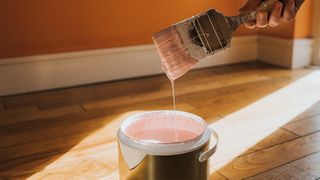When it comes to deciding on the perfect shade, there are a lot of factors to consider. From the overall look and feel of your space to how the color looks in different lights. Plus, you don’t have to be an interior designer to know that paint can also look completely different in every room. So, if you’re wondering how to choose paint colors that will compliment your space rather than crowd it, we’ve got a few tips. And if you’re really stuck with what color to choose, we’d suggest investing in one of the best interior design software (opens in new tab) programs to help you visualize your space in 3D – before you go full steam ahead with the decorating process.
Think about the natural lighting
Natural lighting plays a super important part in how we see any paint color. When the sun is shining, the shade might look lighter than it actually is. And when the sun has set, the color of the paint can look different once again. According to the experts (opens in new tab), if your room is north facing, your rooms will be filled with soft light which produces a very warming effect. While if your room is south facing, you’ll have brighter rooms to begin with. The former can mean paint colors will look even darker. While the latter will mean dark colors will appear even brighter.
Artificial lighting needs to be a consideration, too
The artificial light that glows from our bulbs should also be taken into consideration when it comes to picking your paint shade. Standard white or LED bulbs provide warm and light rooms, while fluorescent lights give off a cooler tone. So when picking your paint hue, make sure you look at the paint shade in all the different lights you’ll see it in. That way, you’ll be sure that the color works for you.
Inject warmth through clever color options
The right lick of paint can give your home a warm and cozy feel. Something we all strive for, right? And with fall now in full swing, there’s never been a better time to up the cozy-factor with the power of the right paint color. But to do so, you don’t need to go crazy with color. Just consider making clever choices when it comes to the shade. For example, if you’re a minimalist with a passion for clean zones, consider upgrading your room with a warmer shade of white, like a creamy white, rather than a shade with an icy tone. Or for those who have got a penchant for bold shades, a mustard yellow or rich shade of red can help add a glow to any space. If gray is your vibe, opt for a color that comes with a dark blue undertone for an injection of warmth.
Dreamy hues = a better night’s sleep
It’s true. Soothing shades can help you drift off to sleep, as we examine in our feature on how to choose the best bedroom wall colors for sleep (opens in new tab). According to the National Sleep Foundation (opens in new tab), the color of your bedroom walls can exude a restful state of mind. Soothing shades can help to reduce your heart rate and blood pressure – both of which can help contribute to a more peaceful night’s sleep. However, not all colors are created equal. When it comes to the top-rated hue to help you catch 40 winks, blue seems to be the color of choice. A study by hotel chain Travelodge (opens in new tab) found that people who went to sleep in a blue room slept the longest, when comparing them to all other different colored rooms slept in. The study also stated that 58% of participants regularly reported waking up ‘feeling happy’. It looks like blue really is the color.
Create a feature wall
Typically, feature walls provide you with a brilliant opportunity to play around with shapes, colors and textures. They are a sure-fire way to inject interest into a room and create a fascinating focal point. And usually, because you are only painting one wall, feature walls are a quick and easy way to liven up your space in no time. One of the newest ways to incorporate a feature wall (or walls) into your home is to paint the bottom half of the wall one colour and the top, another. Or another new idea is to paint the ceiling instead. The latter can help to create clearly defined zones in your space. While the former adds interest into your home. Plus if you’re stuck between two complementary paint shades – you don’t have to choose just one.
Get clever with soft furnishings
If you’re still wondering how to choose paint colors – why don’t you decide on the shades of your soft furnishings, instead? Although paint can be changed, it’s much easier (and quicker) to swap in and out some home decorations. From cushions to curtains (opens in new tab) and throws (opens in new tab) to rugs (opens in new tab), soft furnishings like this from Target will provide an instant color refresh in your space, without you having to commit to a paint shade. Plus the colors of the soft furnishings you chose might even help you pick a paint shade that matches perfectly.


